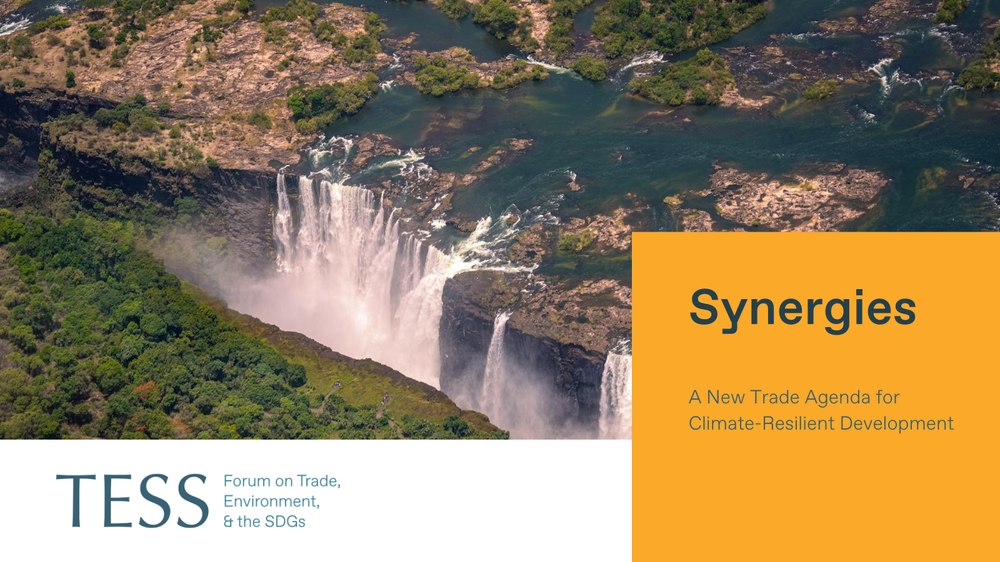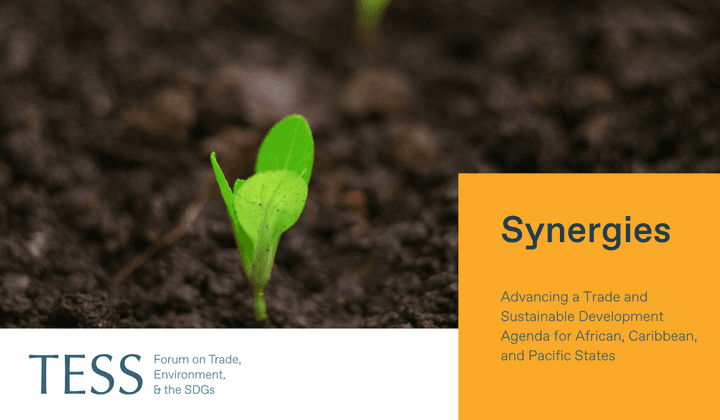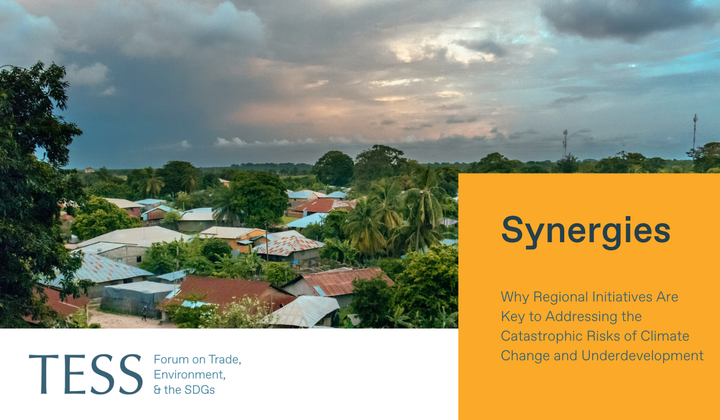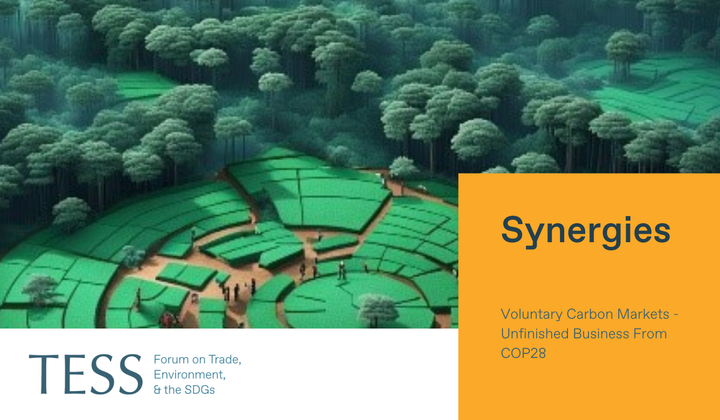Although today’s geopolitical landscape is fraught with uncertainty, it also creates opportunities to advance green solutions missing from current trade frameworks. But policymakers must be prepared to introduce new trade rules that support low-carbon transitions in Africa and across the Global South.
This article is part of a Synergies series on climate and trade curated by TESS titled Addressing the Climate Crisis and Supporting Climate-Resilient Development: Where Can the Trading System Contribute?
Any views and opinions expressed are those of the author(s) and do not
necessarily reflect those of TESS or any of its partner organizations or
funders.
This article is a collaboration with Project Syndicate and was first published here: https://www.project-syndicate.org/commentary/reimagining-trade-for-climate-justice-in-africa-and-beyond-by-saliem-fakir-2025-07
© Project Syndicate – 2025
-----

Mitigating the worst effects of climate change requires reconciling ambition and justice. But achieving both a just energy transition and ambitious global climate action depends on trade rules that foster equitable development. To facilitate the shift to low-carbon economies, developing countries must have reliable access to green technologies, investments, and international markets.
Regrettably, many of today’s trade policies constrain developing countries’ green ambitions. In particular, the securitization of international trade – driven by the geopolitical interests of major powers and emerging blocs – threatens to disrupt global supply chains, limit access to emerging technologies, and reinforce existing power imbalances. If left unchecked, this trend risks undermining multilateral cooperation and regional integration efforts across the Global South.
The European Union’s Carbon Border Adjustment Mechanism is a prime example. While the CBAM is intended to position the EU as a global leader on climate action, many developing countries – particularly in Africa – view it as a protectionist measure and question its alignment with the principles of the 2015 Paris climate agreement.
These concerns are well-founded. Research suggests that African countries could lose up to $25 billion annually as a direct result of the CBAM, while proposed amendments may further disadvantage African exporters. Moreover, despite the establishment of the African Continental Free Trade Agreement (AfCFTA), the EU continues to pursue fragmented bilateral deals that undermine Africa’s integration agenda and weaken the coherence of regional trade strategies.
Another example is the International Maritime Organization’s controversial plan to introduce a carbon emissions tax on shipping. Set to take effect in 2028, the tax falls far short of the more ambitious carbon levy developing economies had advocated, which could have supported low-carbon transitions, climate adaptation, and capacity-building in the world’s most climate-vulnerable countries.
Investor-state dispute settlement mechanisms also present significant challenges to effective climate action. These provisions, embedded in international investment treaties, often limit African governments’ ability to legislate in the public interest or implement trade and investment policies that support green industrialization and sustainable development.
In recent years, international development practitioners have increasingly focused on the link between trade and climate policy. This signals a shift from a purely normative view of climate change to a more pragmatic approach that recognizes climate policy as a driver of economic growth and investment. At the same time, global trade is undergoing a profound transformation as major trading powers prioritize geopolitical and economic self-interest over longstanding commitments to non-discrimination and multilateral cooperation, thereby weakening the World Trade Organization.
Against this backdrop, developed and developing economies alike are deploying fiscal stimulus packages, subsidies, and protectionist trade measures to align their climate goals with domestic green industrial strategies, aiming to reshape the global economic order in their favor. The race to gain a competitive edge in green industries is partly driven by the dominant position China has established over the past decade through a combination of fiscal expansion, strategic subsidies, and control over critical minerals and key supply chains.
Adding to these tensions is US President Donald Trump’s decision to withdraw from the Paris climate agreement, as he did during his first term. This move has further eroded global trust and undermined multilateral climate cooperation, casting doubt on the reliability of developed countries’ commitments to the broader sustainable-development agenda.
Yet periods of geopolitical realignment can also create new opportunities. Even amid rising tensions and economic fragmentation, there are opportunities for African countries to advance fairer, climate-aligned trade rules. One of the most promising is increased regional integration.
Despite deep divisions within the G20, South Africa’s presidency of the group this year could help advance trade policies that are better suited to managing climate risks and accelerating clean-energy transitions in the Global South. The upcoming Leaders’ Summit in Johannesburg provides a platform to champion a more inclusive agenda that integrates risk management, economic diversification, and industrial development into a long-term vision of environmental justice.
Low-income economies are particularly vulnerable to measures like the CBAM, which, in its current form, departs from the “common but differentiated responsibilities” principle that underpins the United Nations Framework Convention on Climate Change (UNFCCC). Without careful design and implementation, it could exacerbate inequalities within Africa and jeopardize the continent’s energy transition.
To prevent such an outcome, the CBAM must be implemented through a transparent, multilateral framework that acknowledges differences in countries’ historical responsibility and capacity to respond. Redirecting CBAM revenues toward supporting green transitions in low-income economies, for example, would be a step in the right direction.
It is equally important to help countries that rely heavily on fossil fuels diversify their economies. This raises a fundamental question: How can trade policy be leveraged to foster climate-resilient development? The answer lies in recognizing that diversification is not only central to long-term growth but also crucial to building resilience to both climate disasters and external shocks.
While global consensus on climate policies remains out of reach, regional trade agreements and coalitions offer a viable path forward. The AfCFTA, for example, could help us reimagine trade as a catalyst for inclusive development. By strengthening intra-African trade and economic resilience, it could help unlock new pathways to food sovereignty, climate adaptation, and long-term stability across the continent.
The world needs fresh thinking and more equitable relationships between the Global North and South. Although today’s geopolitical landscape, marked by self-interest and weak leadership, is fraught with uncertainty, it also creates space to promote green, climate-conscious solutions that are largely absent from existing trade frameworks.
When the current turbulent period gives way to renewed cooperation, we must be ready to introduce a new climate-trade framework. Such an arrangement should support decarbonization across industries while upholding the principles of justice and solidarity, ensuring that developing countries are actively supported on their path to a more sustainable future.
----------
Saliem Fakir is Founder and Executive Director of the African Climate Foundation.
-----
Synergies by TESS is a blog dedicated to promoting inclusive policy dialogue at the intersection of trade, environment, and sustainable development, drawing on perspectives from a range of experts from around the globe. The editor is Fabrice Lehmann.
Disclaimer
Any views and opinions expressed on Synergies are those of the author(s) and do not necessarily reflect those of TESS or any of its partner organizations or funders.
License
© Project Syndicate – 2025 – This article is a collaboration with Project Syndicate.
You may not modify, publish, transmit, participate in the transfer or sale of, reproduce, create new works from, distribute, perform, display, or in any way exploit, any of the content.




